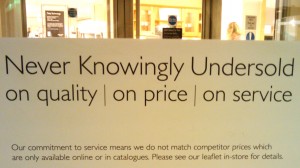Never knowingly understood
I’ve really got it in for the posh shops these days. First Waitrose, now this. But I feel John Lewis’ recent revision of its venerable slogan merits a post.
The slogan in question is ‘never knowingly undersold’. It was first adopted in 1925, and I think it’s a stone-cold classic, brilliantly combining a solid promise of value (we’ll match or beat any price) with overtones of ‘heritage/old’ and (therefore) ‘reliable’ as a result of its slightly quaint wording. I’m sure a lot of people could recite it if challenged, certainly at last as many as could recall the current slogans for M&S or Tesco.
This Brand Republic article from 2003 says that fewer than half of consumers actually understand ‘never knowingly undersold’, citing the obscurity of the word ‘undersold’ . The article warns against a slogan becoming ‘part of the wallpaper’, but I’m not sure that’s such a big problem. If it’s memorable, and people roughly understand it, it could still keep the brand in their minds.
Besides, there’s more to clarity than vocabulary. What do slogans like ‘for the journey’ (Lloyds TSB) really mean? The words are simple, but the meaning is hazy – at best. At least ‘never knowingly undersold’ is sharp and distinctive.
So it still works as a slogan, or at least an evocation of John Lewis’ heritage. Problem is, it’s not quite true any more. Like many high-street retailers, John Lewis is routinely undersold by its online counterparts. So now it only promises to price-match its high-street rivals – not online-only businesses. (See this page at their site for more.)
Changing the slogan to ‘sometimes knowingly undersold’ wouldn’t really cut it. So instead, the chain has opted to add more text, plus a disclaimer:
Never Knowingly Undersold
on quality | on price | on serviceOur commitment to price means we do not match competitor prices which [sic] are only available online or in catalogues. Please see our leaflet in-store for details.
Presumably, the core phrase was felt to be too much a part of the brand equity to be discarded. But the new bits, while seeking to add more to it, actually dilute it. If people do understand the verb ‘undersold’, they’re surely going to make a link with price. So extending the concept to cover quality and service can only muddy the waters and put doubt in their minds. If they’re not sure about ‘undersold’, the new slogan heaps Pelion upon Ossa.
Either way, confusion reigns. Can a shop really be undersold on quality, or service, as well as price? What does it mean, exactly, to be, or avoid being, undersold on service? Have I misunderstood the word?
No, you haven’t. John Lewis’ marketers have – knowingly. By trying to hang too many meanings on a simple phrase, they’ve dragged a classic consumer slogan into the wastelands of B2B anonymity: bland assurances of ‘service’ and ‘quality’, tripartite slogans, vertical lines in text. What were they thinking?
The small print underneath will rarely be read, particularly in locations like the one shown above (the door from the car park to the kitchen department in the Norwich branch). But its very presence generates a subliminal sense of hedging, damage limitation and arse-covering. I’m buying a kettle, not signing a pre-nup. Enough with the conditions already!
‘Never knowingly undersold’ feels like a phrase that’s outlived its usefulness. But it’s worked hard for 85 years, so maybe it’s time for John Lewis give it a break and think up a new one – one simple enough to be always readily understood.
